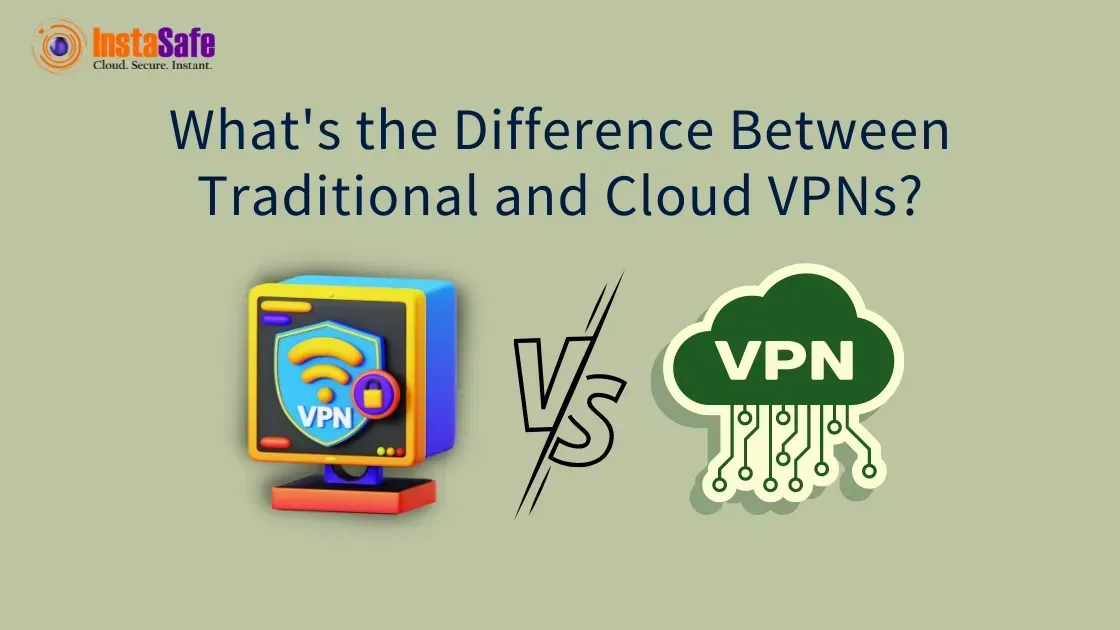What’s the Difference Between Traditional and Cloud VPNs?

As the remote working environment and work-from-home scenarios started becoming the new norm, many businesses started adopting the Virtual Private Networks (VPNs) to connect remote employees to the company network.
A traditional VPN solution is affordable, easy to use and highly convenient for businesses. However, as cybersecurity attacks and data breaches get more mature and advanced, traditional VPNs don’t prove to be the best security solutions because of multiple reasons.
And this is where a cloud VPN solution comes into play. In this article, we’ll see what traditional and cloud VPNs, the problem with traditional VPNs, are and how the two VPNs differ from one another. We’ll also see the best VPN alternative you can use for your organisation’s network. Let’s go!
What Are Traditional VPNs?
A Virtual Private Network is a security solution that helps you establish a secure and protected network connection while using the public network. It encrypts the data that travels through the network and hides the user identity.
However, while it is difficult for third-party users to steal the data, they can still access your network using the same internet as you.
A traditional VPN Server needs a third-party Human-machine Interface (HMI), embedded or PC-based, to provide widgets and data logging services to configure remote access screens.
However, traditional VPNs don’t meet the needs of modern organisations and enterprises, as they aren’t optimised for cloud or large-scale remote environments. Here are some of the major problems with the traditional VPN services:
- VPNs work on the perimeter-based access solution, assuming excessive implicit trust for all users within the network and making it easier for malicious entities to exploit the network.
- VPNs increase the attacks surface by exposing users’ IPs to the external network, which can be accessed through malicious means.
- VPNs increase management complexity as they are difficult to scale, adding additional maintenance and operational costs.
- VPNs result in performance issues and increase the chances of backhauling the data through traffic, resulting in latency issues and impeding network connectivity.
Now let’s see cloud VPNs and how they differ from traditional VPNs.
What Are Cloud VPNs?
Cloud-based VPNs are Software as a Service (SaaS) that offer secure network connectivity with seamless configuration and setup.
A cloud VPN service includes a local VPN router, a remote VPN client, and a cloud-hosted VPN server. It has a much simpler operation and a user-friendly interface than the traditional VPN solution.
Here’s a quick overview of how the cloud and traditional VPN services differ from each other.
The cloud VPN importance is more as they offer much better network security and data protection than the traditional VPN services; implementing the Zero Trust approach is one of the best replacements for VPNs.
Let’s learn more about it and why it’s an ideal cloud VPN alternative.
Zero Trust: A Secure Alternative to VPN
A cloud-based and remote Zero Trust alternative to VPN upgrades your organisation’s security posture and strengthens your business’s network security.
Implementing Zero Trust instead of VPNs provides multiple benefits as it works on the principle of “Never Trust, Always Verify” to offer a unified, secure, scalable, and simple access solution.
Here are the benefits of the Zero Trust Security approach for your organisation:
- Zero Trust doesn’t assume each user to be trusted and removes the implicit trust, requiring every user to go through the strict authorisation and authentication process to access network resources.
- It provides users access to the resources on a need-to-know basis, reducing internal breaches and risks.
- Zero Trust prevents lateral movement and secures your cloud resources.
- Compared to VPNs, Zero Trust provides secure and seamless network access to the users with smooth performance.
- It eliminates the backhauling and latency issues significantly.
- It removes the redundant VPN-based security stacks and reduces management complexity with quick and easy scalability.
Thus, Zero Trust proves to be a secure and the best alternative to traditional VPN solutions.
Conclusion
Ensuring high network security and preventing the risks of security attacks and data breaches is important for your organisation.
While traditional and cloud-based VPNs encrypt the data and provide a secure remote connection, their implicit trust and perimeter-based model fail to meet the needs of modern enterprises.
Thus, if you wish to secure your network and ensure maximum security, check out our Secure VPN alternative, an excellent InstaSafe solution. Get granular control, seamless remote access, and more with our Zero Trust InstaSafe solutions. Go through our services and book a free demo to know more.
Key Products
MFA | I&AM | ZTNA | Zero Trust Application Access | Secure Enterprise Browser
Key Features
Single Sign On | Endpoint Security | Device Binding | Domain Joining | Always On VPN | Contextual Based Access | Clientless Remote Access | Device Posture Check
Key Solutions
VPN Alternatives | DevOps Security | Cloud Application Security | Secure Remote Access | VoIP Security
